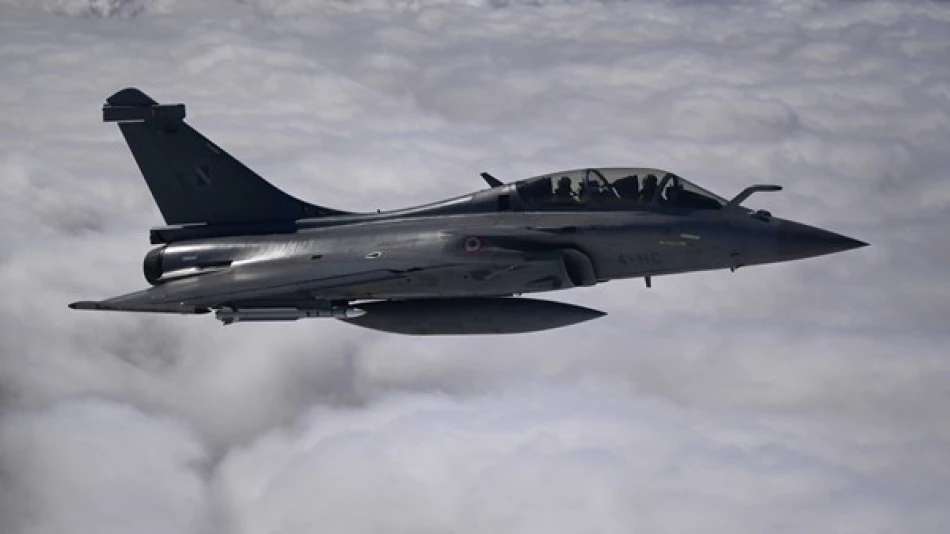
Macron Pledges French Fighter Jets to Bolster Poland's Airspace Defense
France Deploys Fighter Jets to Poland as Drone Incursions Test NATO's Eastern Defenses
President Emmanuel Macron announced Thursday that France will deploy three Rafale fighter jets to help protect Polish airspace after Warsaw reported that approximately 20 drones violated its territory earlier this week. The incident marks a significant escalation in regional tensions and highlights the vulnerability of NATO's eastern flank to aerial intrusions, prompting immediate military reinforcement from Western allies.
Immediate Response to Airspace Violations
The French deployment comes after Polish authorities confirmed that 19 drones breached their airspace between Tuesday and Wednesday, causing property damage to a house and vehicle in the country's eastern region. While no casualties were reported, the scale of the incursion—nearly two dozen unmanned aircraft—represents one of the most significant airspace violations in the region since the conflict in Ukraine began.
"Following drone incursions into Poland, I have decided to deploy three Rafale fighters to help protect Polish airspace and Europe's eastern side alongside our NATO allies," Macron announced on social media platform X.
Strategic Implications for NATO's Eastern Defense
Poland's Vulnerable Position
The incident has sent shockwaves through Poland, which shares a 330-mile border with Ukraine and has become a critical logistics hub for Western military aid. Warsaw has consistently advocated for strengthened EU and NATO military capabilities on its territory, viewing itself as the first line of defense against potential spillover from the ongoing conflict.
This latest breach validates Polish concerns about inadequate air defense coverage along NATO's eastern perimeter. Unlike Western European nations that enjoy multiple layers of integrated air defense, Poland's eastern regions remain exposed to low-altitude threats that can evade traditional radar systems.
France's Calculated Military Diplomacy
Macron's swift deployment of Rafale jets serves multiple strategic purposes beyond immediate air defense. The move demonstrates France's commitment to collective defense while positioning Paris as a key security provider in Eastern Europe—a role traditionally dominated by the United States.
The choice of Rafale aircraft is particularly significant. These multirole fighters possess advanced radar systems capable of detecting small, low-flying targets like drones, making them ideal for counter-drone operations that conventional air defense systems might miss.
Broader Security Architecture Under Pressure
The drone incursions expose critical gaps in NATO's integrated air and missile defense system. While the alliance has invested heavily in protecting against ballistic missiles and conventional aircraft, the proliferation of cheap, commercially-available drone technology has created new vulnerabilities that existing defense networks struggle to address comprehensively.
Similar challenges have emerged across conflict zones worldwide. Israel's Iron Dome system, despite its sophistication, has faced difficulties intercepting swarms of small drones. Ukraine's experience has shown that even basic commercial drones can be weaponized effectively, forcing military planners to reconsider traditional air defense strategies.
Economic and Political Ramifications
For defense contractors and military technology firms, incidents like these underscore growing demand for counter-drone systems and integrated air defense solutions. Companies specializing in electronic warfare, directed energy weapons, and AI-powered threat detection are likely to see increased investment as NATO members rush to plug capability gaps.
The deployment also carries political weight within the EU's evolving defense framework. As European nations gradually reduce dependence on American military protection, France's rapid response positions it as a credible alternative security guarantor—a role that could influence future defense procurement decisions and alliance structures.
Poland's call for enhanced military capabilities on its territory will likely accelerate NATO's ongoing adaptation to threats along its eastern borders, potentially leading to permanent increases in forward-deployed forces and advanced air defense systems throughout the region.
Most Viewed News

 Layla Al Mansoori
Layla Al Mansoori






